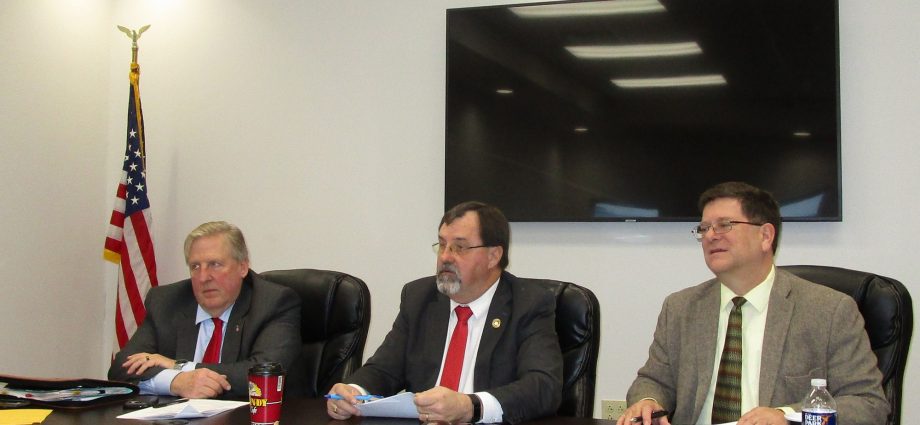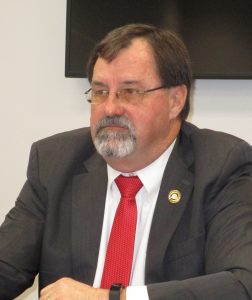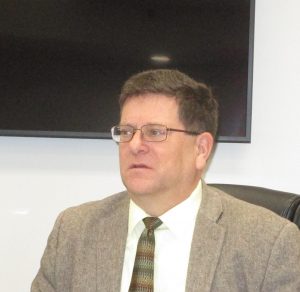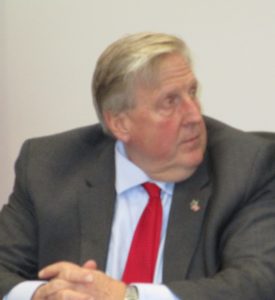Bradford County commissioners (above, from right) Ed Bustin, Daryl Miller, and Doug McLinko and chief clerk Michelle Shedden conducted their Jan. 23 public meeting at the new Wysox Township Building, which opened in August. Township officials provided a tour to members of the press and others afterward.
Photos and story by Rick Hiduk
(Exclusive to EndlessMtnLifestyles.com readers)
The Bradford County commissioners traveled to Washington D.C. on Jan. 10 at the invite of Chad Rupe and Curt Coccodrilli of the USDA with high hopes of helping those at the federal level better understand that boosting “middle mile” broadband infrastructure is the best way to get high speed internet and cell service to rural communities.
Though all three remain grateful for the opportunity and feel that they plead their case efficiently, they left with the feeling that they are still on their own in addressing an issue that plagues isolated residents across the nation. “Disappointing” was the key word used by commissioner Ed Bustin when asked how the meeting had gone. “We had a great team and a great deal of information,” Bustin continued. “I think we had the right people, and I think we were listened to. But what we are doing does not fit the model of what the federal government is funding for rural broadband.”
“They were all very attentive and they understand what we are trying to do,” commissioner Daryl Miller concurred. “But they have to be last-mile providers.”
The “last-mile” approach has been utilized successfully by state, federal and local governments to get natural gas to consumers in the Marcellus shale region, and the federal government sees that program as a template for funding broadband initiatives. “We get that,” Bustin maintained. “But their model doesn’t work for Bradford County.”
In January 2019, the commissioners approved the spending of $1-million in Act 13 funds to initiate the first of three phases of fiber-optic infrastructure geared to fill gaps in the county’s emergency communications and to attract communications companies to tap into the lines to get better service to more people as the Progress Authority Broadband Initative.
“We want to be middle mile providers,” commissioner Doug McLinko stated. “The service here is lousy. If three people on your street are trying to watch Netflix, it’s not going to work.”
“If you can’t get the middle mile, how are you going to get the last mile?” Miller postulated.
In July, a federal non-partisan bill to address inadequate rural broadband was introduced with $5-billion committed to “last-mile buildout.”
During the course of a daylong event focusing on natural gas and other energy, the commissioners felt that they had caught the appropriate ears with their broadband initiative and were confident that they could convince lawmakers in Washington of the merit of their unique plan. But they found those holding the purse strings to be reluctant to invest in “franchized areas,” even if the service there is deemed “deplorable.”
“That has a lot of the country locked up,” McLinko remarked. “I really thought that we’d walk away with something. I never thought it would be a magic wand.”
“They didn’t say ‘No.’ They gave us a path to follow, but it’s incredibly tedious,” Bustin related.
Nonetheless, a public official from rural Texas was intrigued enough by the Bradford County model to ask if the commissioners would visit him there.
Though somewhat discouraged by a lack of immediate progress in the nation’s capitol, the commissioners were unanimous on Thursday in their commitment to move forward with their original plans. “We are confident that we are breaking new ground,” Bustin asserted. “Let’s get the thing up and prove that it works.”
“We’re putting up a robust enough system that the other providers can hook onto,” Miller added. “We are opening the area up to competition.”
“If this middle mile theory works, can you imagine how much money we can save the state and country?” Bustin pondered openly.
“It will work. As we move out into darker areas, the possibilities are endless,” Miller insisted. “Companies will be able to reach customers that they wouldn’t otherwise have been able to. We will have dark fiber loops within six miles of every resident and school.”
Construction of the first loop is expected to begin in a couple of weeks, starting near Towanda and branching out toward Troy and East Smithfield, turning eat toward Sayre and Athens, then returning to Wysox. That will meet the immediate needs of the county in terms of allowing the 911 Center to better sequence their signaling.
“Once the first loop is done, we’ll have a better idea of labor costs,” Bustin explained.
In the meantime, McLinko said that he has grown tired of listening to the federal government’s ballyhoo about getting high-speed internet to every American, stating, “Don’t talk about rural broadband until you’re ready to talk to us.”



